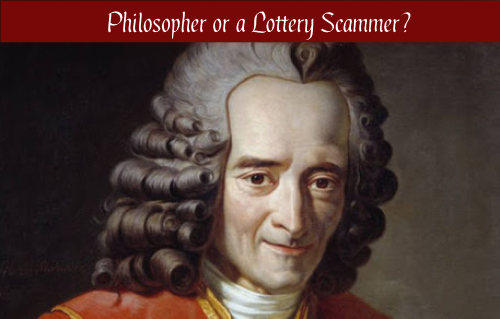Voltaire: France’s Best Known Philosopher or a Lottery Scammer (Or Both)?

A prolific writer and philosopher whose mind saw things ahead of his time, Voltaire is also known for a couple of less reputable endeavors. Few people know that he was a spy for the French government and became incredibly wealthy by rigging the lottery.
Voltaire and the Lottery: Falsification in the Making
In 1729, Voltaire came up with a plan to change his fortune by exploiting weaknesses in the French lottery.
To accomplish his goal, the philosopher teamed up with mathematician Charles Marie de La Condamine. The duo knew of a loophole in the lottery and planned to utilize that oversight to their advantage.
At the time, the lottery was tremendously popular. During the 18th century, France was going through a massive financial crisis. Banks and the loans provided without accounting for collateral were to blame for the entire country nearly going bankrupt. In an attempt to overcome the situation, French rulers decided to focus on the lottery. By buying tickets, people were contributing to the national budget. The plan was ingenious as the lottery was accepted much more favorably than new taxes.
When Voltaire came up with his ingenious plan, there were two kinds of lotteries in the country.
The old-school blank lottery was a raffle-style game. Just like they do today, participants ordered pre-printed and numbered tickets. All tickets were named and placed in a container. Another container held paper slips that either featured a prize or it was blank. When the time came, a child drew from both containers, matching lottery tickets to a specific prize.
The second and more innovative type of lottery was numerical, and it came from Genoa. For it to take place, a child drew five numbered balls out of 90. Players had the freedom to bet a certain amount on either a single number being drawn or a combination of numbers. This game was pretty much a predecessor to most numerical, draw-style lotteries that we play today.
Since both of these opportunities proved to be significant successes, the government decided to continue experimenting with similar formats. In time, new lotteries were born in an attempt to generate more money for the national budget.
Back to Voltaire and the lottery. At the time, the philosopher, much like the rest of the French population, was going through financial struggles. An opportunity arose when he met Charles Marie de La Condamine during a dinner party. The two of them discussed opportunities to become wealthier by exploiting a technical weakness in the lottery organization. According to Charles, what they were about to do was not illegal but rather an exploitation of an existing loophole.
The Voltaire French Lottery Masterplan
To help raise money for the national budget, the government had issued a series of bonds. Unfortunately, however, the economy was in dire straits at the time. To recuperate for all incurred losses, the government reduced interest rates on said bonds significantly.
Since the interest rate wasn’t the same as what the government initially announced, the value of the bonds and interest in their acquisition diminished significantly. This issue made it very difficult for the government to continue making money by issuing bonds.
The French minister of finance was tasked with turning the situation around. He came up with an ingenious solution for the diminishing popularity of the bonds. As per his plan, bond owners were to be allowed lottery ticket purchases. These purchases would correspond to the value of the bonds owned by an individual.
Anyone who won the lottery would receive a prize equal to the face value of their bonds. The offer was a perfect one since getting money on the bonds’ market had become a nearly impossible task.
On top of the market bonds’ face value, winners would be provided with an additional reward of 500,000 livres – an amount that added up to a significant wealth in a financially devastating 18th century France.
Charles Marie de La Condamine studied that new opportunity to discover that the math behind it was very flawed.
To participate in the lottery, a player needed to own a bond. Bonds differed in value, but all of them provided the same opportunities. A single lottery ticket cost 1/1000th of a bond. It didn’t matter whether you owned an expensive or a rather cheap bond (the government provided both opportunities). The ticket was tied to a portion of the bond, and it didn’t have an individual price tag.
Charles did the math, and he concluded that by buying some of the cheapest government bonds, he could guarantee enough lottery tickets to beat the odds and claim fairly decent prizes from the lotto. That is how the Voltaire lottery rig was born.
A Fortune in the Making
Our clever mathematician had worked out the numbers, but he needed partners and investors to implement the French lotto rigging plan.
Voltaire was approached and offered participation, but he wasn’t wealthy by any means. The philosopher wasn’t that popular either, but he was perceived as an incredibly charismatic man. He also had the connections that the duo could exploit to find investors for the lottery rigging initiative.
By working together, the pair managed to establish an entire syndicate of willing participants. The aim was to buy as many bonds as possible without arising suspicion. And since only a few notaries sold the bond, Charles and Voltaire needed a group of people to make individual purchases and add up to the group’s perspective wealth.
Voltaire even went ahead to talk directly to one of the notaries and secure a sufficient number of bonds for the syndicate.
It may seem not easy to believe nowadays, but at the time, the plan worked well.
The syndicate won multiple times, collecting rather large sums from the government time and time again. The Voltaire French lottery scam went on for about two years. It probably would have continued working much longer had Voltaire not bragged about it.
In his typical manner, Voltaire would write certain phrases and statements on the back of the tickets. Some of these gave away the scheme to a degree. And although Voltaire signed the tickets with made-up names, the rather provocative statement caught official attention.
Lottery organizers looked into the matter to find out that many of the bond lottery prizes were being claimed by the same people. Eventually, the investigation reached Voltaire and Charles. The duo was taken to court by the French finance minister. The court, however, ruled out that the syndicate hadn’t done anything illegal.
Still, the discovery of the rigging attempt has a profound effect on the French lotto landscape. The bond lottery was discontinued.
What Voltaire and Charles Marie de La Condamine Did with Their Fortune
Before the bond lottery got discontinued, Charles and Voltaire have managed to snatch up about 500,000 livres through the lottery rigging syndicate. That was a ridiculous amount, and since the court didn’t find any violation, both the philosopher and the mathematician ended up being stupendously wealthy.
As an eccentric and curious mind, Charles Marie de La Condamine used the money to fund various trips, including one to the Andes. From that location, the mathematician attempted to measure the circumference of the earth and also to learn more about its shape. Condamine is also known for mapping the Amazon River, defining the length of the meter, studying rubber and quinine, which were unknown in Europe at the time.
Voltaire invested his money in numerous businesses. He often used his connections and networking to learn about potentially profitable ventures to join. While using his connections, Voltaire continued alienating the French elite and criticizing the government. This is one of the reasons why many of his works were outlawed at the time.
And that’s the story of how the French government unknowingly funded two great minds through its lottery. Had it not been for the lottery rewards, many of Voltaire’s and Condamine’s works would have never come to reality. The financial security allowed both of them to explore, let their minds wander, and take new creative directions without worrying about financial security.

Marry Levental is a writer and content contributor at LotteryPros with a genuine passion for both lotteries and storytelling. Known for her energetic writing style and attention to player concerns, Marry covers everything from platform reviews to industry news with clarity and heart. She brings a balanced perspective to her articles, always aiming to help readers make informed, confident decisions. Her enthusiasm for the lottery world is evident in every piece she writes.